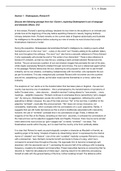S. V. H. Boyes
Section 1 - Shakespeare, Richard III
Discuss the following passage from Act I Scene I, exploring Shakespeare’s use of language
and dramatic effects. [15]
In this extract, Richard’s opening soliloquy declares his true intent to the audience in an intimate and
private tone at the beginning of the play before exploiting Clarence’s naivety, feigning brotherly
intimacy between them. Richard remarks on the current state of England sardonically and illustrates
his intelligence to the audience before colouring our view of events via word choice that cruelly
foreshadows Clarence’s murder.
During the exposition, Shakespeare demonstrates Richard’s intelligence by creating a quick-witted
homophonic pun on the noun “son” - a play on the word “sun” thereby adding to the pathetic fallacy
that runs throughout the soliloquy. The word “sun” also forms a sarcastic reference to Prince Edward
V who supposedly will provide the end to “the winter of our discontent.” There is also reference to
Edward IV’s emblem, as that too was the sun, creating a stark contrast between Richard and his
brother. The pun announces a pattern of sun and shadow images that permeate the rest of the play,
whilst clearly expressing Richard’s intellect through word choice. The sun is referenced again further
in the passage: Richard denounces the sun, deeming its only purpose to allow him to see himself
indirectly via his own shadow, contrasting metaphorically with his brother, who represents the sun
(as per his emblem). This also metaphorically contrasts Richard with his brother and the courtiers
around him, establishing a divide, as the latter would admire themselves in a mirror, rather than
indirectly.
The anaphora of ‘our’ alerts us to the transformation that has taken place in England - the war-torn
country has become one of celebration - this is emphasised by the transformations of symptoms of
battle (“bruised arms… stern alarums… dreadful marches”) having altered to “monuments… merry
meetings... delightful measures.” Richard continues to emphasise this by personifying “grim-visaged
war”. By doing so, Shakespeare causes the conflict to lose its aggression, reflecting the current
peacetime in Britain. However, the use of the male pronoun “his” in the next line, in addition to the
adjective “wrinkled”, could alter this announcement. “His” does not convey innocence, nor
vulnerability, traditionally, which contrasts with the connotations of a ‘pure’ peacetime. Rather, it
suggests that war still holds dominance as this is what is traditionally associated with masculinity;
however, the use of “wrinkled” contrasts this in its connotations of age. Firstly, it reflects the
longevity of the War of the Roses, remarking on their end - secondly, it contrasts the connotations of
the male pronoun as the adjective suggests frailty and fragility. However, there may be some sinister
intent behind this word choice as “grim-visaged war” is merely “wrinkled” - not dead. This
foreshadows events within the play, as it is clear that the country is far from politically stable.
It is clear that Richard is nearly as psychologically complex a character as Macbeth or Hamlet, as
seething anger of his being “cheated of feature by dissembling nature” is expressed by the internal
rhyme of “cheated” and “feature”. Use of the verb “curtailed” implicitly compares Richard to a dog
with a docked tail - here, Richard connects his birth and body to those of a dog, which he is
compared to several times throughout the play. His rage leads him to become increasingly self-
absorbed, with the assonantal use of ‘i’ permeating the second half of the soliloquy with increasing
frequency, revealing his solipsism and insecurities. These insecurities become so consuming that he
resolves to “hate the idle pleasures of these days”, blaming nature for his deformity and placing
himself at odds with the general feeling of the time, further isolating himself. The sibilance within





